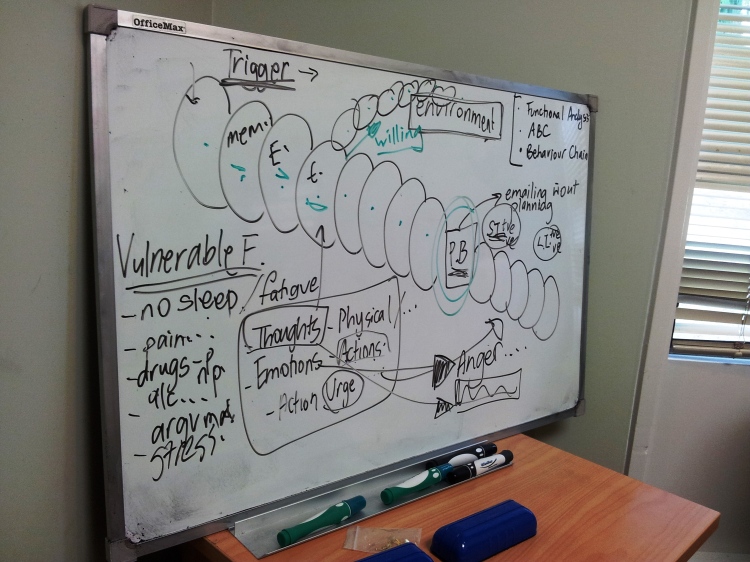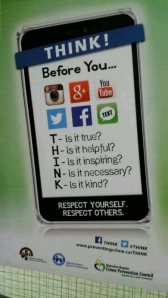I’m currently seeing a clinical psychologist. There’s a few things I’m focusing on with her, and one of them is distress tolerance.
If you follow me on Twitter, you will have seen that I trigger pretty easily. It doesn’t take much to make me upset or angry, and then I often act in impulsive ways as a result. My psychologist calls this having a “raw emotional skin.” I used to think of it like carrying around a wound in my stomach. It’s a pretty grim metaphor, but I felt like I had this wound, and every now and then someone would stick their fingers in it, and this would trigger me into a break down. I now understand that one of the reasons this happens because I have Post Traumatic Stress Disorder.
The impulsive way I react to triggers is know in pysch speak as a “problem behaviour.” This isn’t a judgement, it’s just a term.
So I asked my psychologist:
1. Why do I react this way?
2. How can I learn to not react this way?
3. If I do react this way, how do I deal with the fallout?
Here’s a diagram we worked on together. It’s a bit messy but I’ll guide you through it.
If we begin in the middle with the box that says “PB” – that’s the problem behaviour. For me, I consider saying reactive things on Twitter or my blog to be a PB. I know not everyone will feel that way about that behaviour, but for me, reacting that way puts me in a vulnerable position. It can have pretty negative long-term effects. And it’s really not that helpful. So I want to manage it better.
The interesting thing is, the PB is in the middle. We may feel like our impulses come out of nowhere, but they don’t. There’s three things that contribute: Vulnerability Factors, Triggers, and Environment.
For me, my Triggers are going to be all the more stronger because my Vulnerability Factors and my Environment make me weaker. You can see we started making a list of my VFs – things like lack of sleep, chronic pain, drug withdrawal, and stress.
Often it’s a series of small triggers that will lead to a stress buildup before the problem behaviour occurs. (Those are the circles on the left)
I know that when my Vulnerability Factors are less and my Environment is healthier, I can be “willing” to head myself off at the pass, so to speak. I can change the course of destiny! (Even the smallest person can…).
I have found trying to ask myself these questions to be quite useful:
The problem is that PBs often have short-term positive effects. It can be hard to resist these. When I am triggered and my “raw emotional skin” has been wounded, it’s almost impossible. I’m looking for instant relief from those very intense feelings.
So, sometimes, I’ll say things I regret. These might help me in the short-term, but long-term I’ll feel worse for having reacted in a less-than-considered way. I’m also very aware of being so public about what I am going through, and sharing some of my more controversial opinions – particularly what effect that might have on my career.
So – I know why it happens. I know what I can do to reduce the possibility of it happening – and sometimes, I can put that into practice. But what happens if I just do it anyway?
Usually, the thing I say will put me in a vulnerable position – for example, I might be sharing my mental distress, or I might be sharing my anger about something, and people could respond to these things in any way they like. It’s a bit like stepping off a cliff and wondering if people are going to catch you or add rocks to your pockets. I can’t control what they choose to do. But I can learn to control how I react to it.
Eventually, with the therapy I’m doing, my “raw emotional skin” will heal, my Vulnerability Factors will reduce, and my ability to handle both the triggers, and the problem behaviour if I get to that point, will increase.
In the meantime, understanding the chain of events helps. I can identify the thought pattern, and the emotions, that contribute to the “action urge” – the thing that happens immediately before the PB. Therefore, I can be open and honest – with myself, and others – about what’s happening, and I can take responsibility for it. That won’t always be enough. But often, it really helps.
The best thing is just being aware of the wonderful (herr herr) trifecta that is contributing to that action urge – my Vulnerability, my Environment, and my Triggers. Even if I can’t mitigate them all the time, I can recognise that my Problem Behaviour isn’t necessarily me, if you know what I mean. It doesn’t make me a bad person. It’s actually a pretty understandable reaction to what’s going on for me. That means I don’t feel quite as distressed when I realise I’ve done it.
I hope this makes some sense. I hope it’s not patronising. I’m just very grateful for the opportunity I have at the moment to do clinical psychology, and so I wanted to share some of my learning.
Maybe it’ll be helpful for someone else too.
Addtional note: It’s not always bad to respond to triggers. Nothing is black and white – all one way or all the other. Sometimes, triggers mean that something is very important to us, and standing up about it could be doing good, both personally and socially. I have certainly felt that way about past posts – I know that sharing my opinion about certain things makes me vulnerable, but I accept that because I think my voice can be of value. In this case, however, I have usually calculated the long-term effects and decided the distress is worth it, and manageable. It’s when I don’t do that, that PB occurs.


